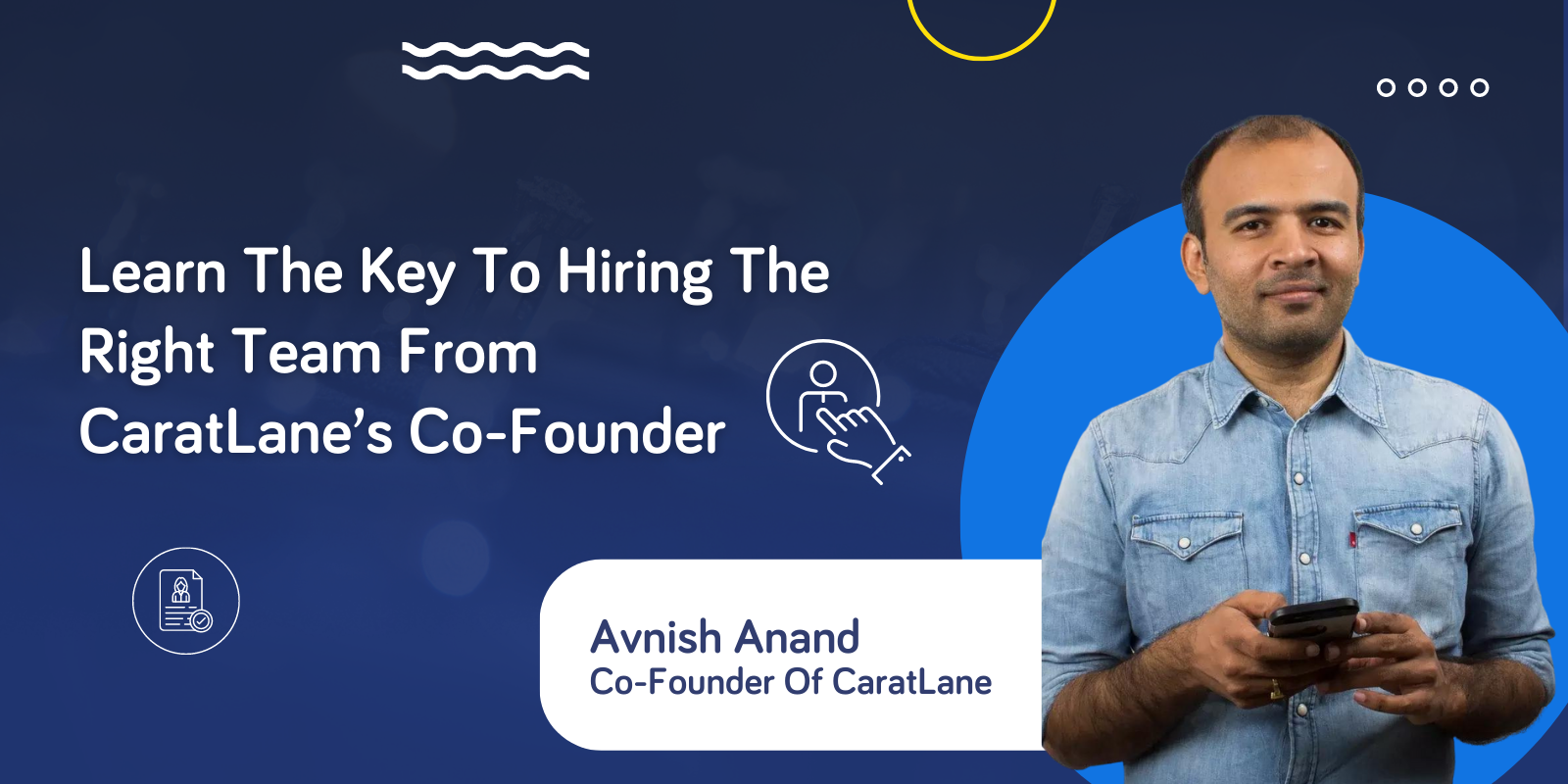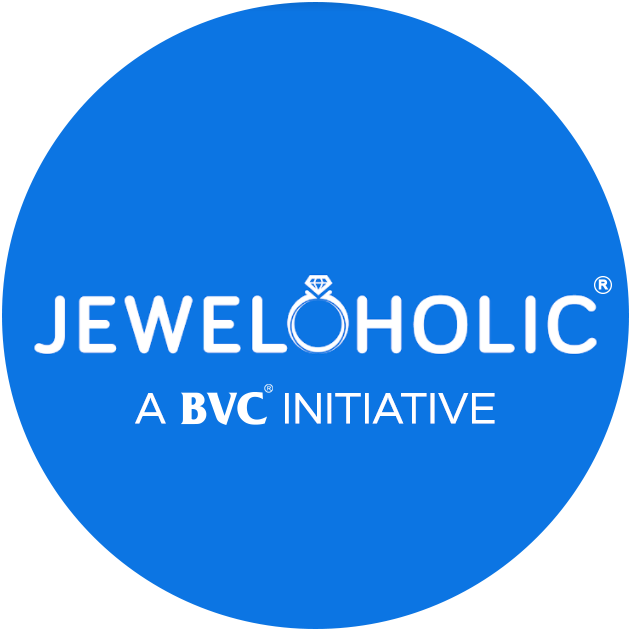Learn the key to hiring the right team from CaratLane’s Co-Founder

Hiring talent to grow your business? CaratLane has shared its notion of hiring talent for better business growth.
While the jewellery industry is where people prefer either hiring someone with experience in the jewellery industry or someone who comes from reference, CaratLane has been among the few to hire non-industry talent. Avnish Anand, the Co-founder of CaratLane, has always been deeply interested in people, and their lives. He loves to understand their stories, their thought process, and what drives them. He will be sharing with us his viewpoint on what policies or type of work culture has he executed to attract fresh talent to join and grow in our industry.

Avnish Anand, Co-founder of CaratLane:
See, if you think about CaratLane, it's like multiple companies. You look at the profile of the people who we hire, one there is obviously a large, I would say digital skill set, product managers, technology people, marketing people, kind of people, or analysts and so on. Then you have a large sales organization and then you have people on their own design, buying, and supply chain insight, a lot of which need some kind of industry exposure or industrial understanding to buy, right? So as far as our hiring is concerned with digital folks, actually, it doesn't really matter whether you have category experience or not. Initially, it used to be harder for us to hire in these roles. But I think, as the organization has done well, we have managed to become better at attracting talent.

The second thing over there is that you know we have initially tried to go by the pedigree approach right that we get people from the best colleges or the best companies and we soon realized not so, it took us a while. That was not the most optimal approach for multiple reasons, actually. One, there was no guarantee of success first because you know it's one thing to have worked in a large organization and done something and it's an entirely different thing to come and build something from scratch right and to work in a company like ours. So then we changed our methods. We don't just depend on pedigree as a proxy for hiring. We look at a lot of other attributes. We always make sure that people have to do a task and we get them interviewed by multiple people. They look for a lot of behavioural attributes like curiosity for example, or your ability to be more collaborative. In fact, the fact is that most people don't want to do the task itself so that itself works as a filter.
After 2015, I would say that we have really been able to become more data-driven so which has helped create a more transparent culture, and more accountability, which also has helped us attract and retain people because a lot of people thrive in such an environment and the fact that the company has done well. Obviously, some people hear about it and that people want to join. The cultural part was never deliberate for the longest time. And you know that is true for a lot of organizations. Although later founders write books about how they thought of it on day zero but that's never the case. It always looks good in hindsight.

In our case, I think it was the personal example that Mithun set for some of us also which helped create a good culture. So in the sense that every time there was any customer complaint, any customer we used to deal with directly, If any customer had an issue with the concern and wanted to talk to somebody senior, there are enough people who we have all spoken to directly. We don't have cabins in our office. We are very approachable and anybody can come and talk directly. We have been very tolerant of failure. Encourage people to take risks, but all of that got developed organically. I think it's only in the last few years that we have tried to kind of take stock of what works well from a cultural point of view. What kind of people do well in this organization? What kind of people doesn't do well? And then how do we kind of distill those elements and create a framework for hiring and retention, performance management, and so on, and so forth.
But now there is a lot of work which has happened in the last year, and hopefully more going forward, things you know, like more reward and recognition for even software elements, the cultural elements. Generally, all your rewards are based on performance measures, right? So you can just talk about it and not walk the talk if you say culture matters right? So, how does culture matter manifest in terms of how people get rewarded and recognized for it also? So this is on the digital part. For the other parts of the business, we had to recruit people from the industry meaning people who have had a great experience, whether it is on the manufacturing, design, or even sales side. Although now what we are starting to see, is that expertise is actually not a great proxy for sales also. Because you know the way we sell is also very different. There are a lot of digital elements.

We want people to use our CRM more effectively, call customers, and use more data, even in the selling process. It's not a very inventory-based selling method, right ki aapke paas bahut sara maal hai (you have a lot of commodities) and you just sell based on that. Basically, the sales at CaratLane is very different from a lot of other retailers. Many people thrive in it, and many people struggle, right? And our data now shows that the best performers are freshers which tells us again that the expertise of having worked in the jewellery industry is kind of overrated. It is, you know, the behavioral elements that matter more i.e. your desire, your willingness to learn, your ability to do more, whether you have possibly empathy or not, and how you work as a team, right? Because a lot of these people work in teams in the store. I think we possibly can say now that it's basically the mindset and the behavioral trait, which is a more powerful predictor of capability in selling rather than jewellery expertise. So that's how we are now looking at sales as well.

But I think definitely on the binding side on design, on merchandise, the expertise matters because that's where the whole understanding of the jewellery and the industry and technology and manufacturing and metallurgy of jewellery matters so much which is where we definitely still want people from the trade who have done a good job.

But also, we want a certain kind of person, who's more open to trying stuff, who's willing to look at data. In our company, even our design team looks at data and we are very proud of that fact, and we really admire them for doing that. We used to struggle initially. It's a creative field, right? You need to look at the aesthetic sense but you talk to a design team today. They will tell you what the funnel looks like and how many pages and what is the card trade for this product. So the language of the design team also is in line with the rest of the organization. So I think the filter for us is that even when you hire from trade, you hire people of a certain kind and I think that is what works for us. And I think what happens is that you know birds of the same feathers flock together, so people who join that find others who are like them for their own connections. Through referrals etcetera. They find it through their own contacts. So that's how I think hiring has happened and how we've built our teams.

I think as we have gone forward more and more we have continued to use less pedigree and more behavioral fitment.
I think that is one important principle for us, across functions in different ways, obviously. I think now there is a lot of data being prepared to even get better insights about people. So like one thing which I started to notice and we're trying to create data to see that people who don't make friends at work for example are likely to be more unhappy and likely to leave and be less engaged. So obviously, you know you will not have friends on day one, but in a way, you know you possibly make more friends if you're more collaborative, or if you're of a certain kind of mindset or what can we do to you know, facilitate more interaction between people across the departments that end up making friends So that is the kind of thing we are starting to look at and then use that as a means to create a better culture, more engagement for employees, happier workplace, a more engaged workplace in that sense.

Every step initiated teaches us something new, be it business or life. We saw CaratLane evolve with each step while hiring people to grow its brand. This has surely guided us in a way that we will apply the lessons from their steps and to learn further we ourselves will take new and different steps. A little more magic is up our sleeves that will enlighten and entertain you.
Come back to explore more with JEWELOHOLIC.
